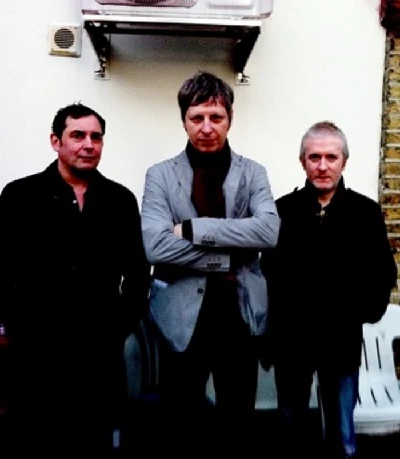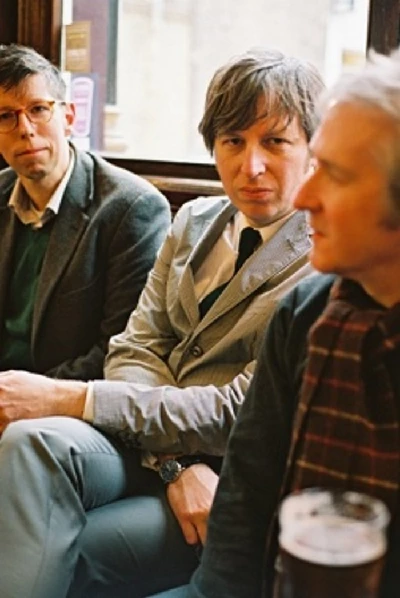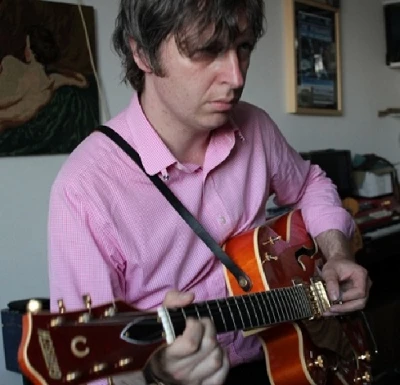Rotifer
-
Interview Part 2
published: 27 /
8 /
2012

...while in the second part he talks about his early music career in Austria and the influence his first trip to Britain as a twelve year old and the month he spent there on Canvey Island had on the album
Article
PB: So, going back a bit further into your music career, am I right in thinking all of the Rotifer albums you have done came out when you had moved over to London?
RR: I’d been making music since I was a teenager. Growing up in Vienna was a privilege, but there weren’t many people around making the kind of music that I wanted to make. I was in a soul-mod-pop band when I was young, but as soon as my songwriting developed, the band broke up. So then I did some things on my own, and I also had another band, but in the mid-1990s, we had to build it up. There weren’t people doing pop songs with guitars. Grunge was very popular, and we weren’t quite rock enough for that, and at the same time, the electronic music scene was growing.
I then had a band called the Electric Eels – no relation to the band of the same name from punk lore – and we built up a certain scene. But it wasn’t big enough to sustain us. When I moved here, I’d just done a double 7” with the Sofa Surfers, a band you may remember who were a dubby, electronic, slightly experimental band in Vienna. They did some pretty exciting stuff, where we worked in some samples with my slightly convoluted chord sequences, not so dissimilar to what Beck was doing at that time.
PB: Why did it take you so long to release another? Was it just the disruption of moving abroad?
RR: I had been quite confident in my English, but I realised when I moved over here that my songwriting had just been a bunch of phrases, and that the things I thought sounded cool were actually just the clichés. So it took me about four years to sit down and think about my songwriting, before songs really came. It was my London friends who actually told me that they thought certain songs sounded good. I was good friends back then with Tjinder Singh from Cornershop, and he recorded one of my songs at his flat in Holloway. In 2001, I thought I had good enough songs to put out a solo album.
But, at the same time, I didn’t have the guts to put out anything over here. Being reasonably well known in Austria, I was always able to find Austrian labels relatively easily. I would put out an album there, and then say that I was going to look for a deal over in the UK, but by the time that happened, I was already bored with the record. I had given it to two or three people who hadn’t written back or whatever, and it was gone.
So, with this album, there was one evening where Darren, Ian and Eric kind of looked at me and said, “No way are you just going to put this out in Austria. We didn’t do all this work just for that!” So, I felt that I needed to do it justice. It took me an awful long time to gather the courage to do this.
I think its getting better with young bands in Austria today. I have curated a festival in Austria (the Viennese Popfest) for the past three years, and bands have a different mindset. We grew up with a mindset that we were doing a toy, miniature version of the real thing, which was Anglo-American pop music.
Also, moving here changed my attitudes. A lot of the myths fall apart, and I changed my mind about lot of the things I thought were great. Like - and I might piss some people off here - but I used to think Elvis Costello was great when I was younger, but having moved here I can’t listen to his music at all. I don’t like the puns, I don’t like the similes, and I don’t like the general tone of it. And that’s not just because I’m a friend of Wreckless Eric! You change your perspective, and I do feel like I’ve got an insider’s perspective now, which also means hating things that I used to love. But I feel like I am speaking on equal terms.
PB: You also seem to be on good terms with a group of bands who often play together and seem to have good relationships. Of course, Darren Hayman, but also Allo Darlin’ and Tigercats and bands like that. Has knowing those bands helped you, perhaps given you a route in to playing more gigs and releasing records in the UK?
RR: In a way, yes. But I feel that what we do is slightly different. We’re kind of the older uncles that are just about tolerated! It’s funny because, through having Ian and Mike in my band, there are other links that open up that are equally valid. I don’t see what I do as necessarily being part of an indie thing. We played with Allo Darlin’ at the Buffalo Bar once, and I thought that – to be honest – many of the people that had come to see them didn’t get much from our music. You have to be honest about that - it’s a slightly different world that they inhabit.
PB: I think - because of the bands we like - we often get an older audience at the Pennyblackmusic nights, who will like your music.
RR: There’s nothing wrote with that, because – you know what – I’m older. I’m 42. Just because I’m 42, it doesn’t mean that all of a sudden I will like classical music. It also means that I have different stories to tell, and that can be enriching. I think my writing has got better. The problem we have is that we tend to look at older bands and say that they’ve lost it, when actually what we mean is that they had a lot of success and they became complacent. I don’t think it is the age itself, but people’s take on life.
Every song I write, I always take care to say something that I really think needs to be said, and anyone who ever asks me about one of my songs should be warned that I will not stop talking! I demand that of the music I hear, as well. I don’t like it when I hear people say, “Oh, it just came out like”, because there should be more to it than that. That approach only works when you have spent a long time thinking about it beforehand.
PB: One of my favourite songs on the album, ‘Canvey Island’ has a really interesting story behind it.
RR: When I was twelve, my parents sent me and sister off, for four weeks, to a place that they were told was right on the outskirts of London - Canvey Island. We arrived there, to stay with an elderly couple, which is one of the reasons why the album was called ‘The Hosting Couple’. They lived in a nondescript house, and he was a retired docker and she was this complete nutcase. I think one of the first things my sister asked was how far it was to London, and they just laughed. So, we had a lot of time on my hands, and it could have been quite a miserable time. There was nothing going on, apart from buying a box of maltesers every day, which I mention in the song, and going up to the Haystack, which was the big pub, and looking through the shop windows.
But, to me, the first holiday you have without your parents has got to be magical. So, in England, in the last throws of the mod revival, you saw kids going up and down the road in Fred Perry shirts, white socks and too short trousers, and I liked the style. I bought my first Fred Perry shirt in Southend. I came back a changed person, and got more involved in British music. That song is about that life changing moment for me. It’s not just an anglicised tribute, it’s also about the desperate and unglamorous side of it. But, it was a new world that belonged to me, that my parents didn’t understand. That song is about how spending a summer in Canvey Island led to me living here. It changed my life completely – both my kids were born here, and they wouldn’t have been born here if it wasn’t for those weeks spent in a strange place.
We did the video in Canvey Island, and of course, like every tourist we went down to the Jetty. Someone posted on YouTube asking why everyone who ever records any footage in Canvey Island has to have the gasworks in it. I’m sorry about the stereotype, but even when I was a kid that was what caught my eye.
One thing that I didn’t think about when I wrote the song or when we recorded it was that there is now the film ‘Oil City Confidential’ (Julian Temple’s film about Dr Feelgood and the Canvey Island music scene – Ed.), and Canvey Island has a kind of common currency. In my head, Canvey Island was a backwater that hardly anyone had heard of. I think that’s a flawed perspective, because it’s actually quite a famous place. But, had I decided to try and write a song from the perspective of it being a famous place of rock and roll, it would have been terrible.
PB: Tell me about ‘The Frankfurt Kitchen’. That song lead to you being invited over to New York and being exhibited in an art gallery, am I right?
RR: It’s from an album called ‘Coach No 12 and 11’, one of my best albums, though it hasn’t come out in this country – you can get it on iTunes. It is a song about the Austrian architect, Margerete Schütte-Lihotzky, who designed the first fitted kitchen, which was designed for the first social housing estate, in Frankfurt. The kitchen is an object of prestige now, and I like it when these things travel the other way, where developments come bottom up. She was an Austrian freedom fighter, was arrested by the Gestapo, and just about escaped at the end of the war. She was a friend of my grandmother, who had been part of the French resistance movement with her husband, and they got to know each other in the Communist Women’s Movement in Vienna after the war.
So her name was a presence in my head, and one day I was on a train, when the rhythm of the sleepers brought her name into my head, ‘Sch-ütte-Li-hot-zky, Sch-ütte-Li-hot-zky’, and I thought that I really had to write a song about her. I did a video for this song, which I painted. MOMA (the Museum of Modern Art) in New York saw the video on YouTube, asked me to come and perform it and actually bought the video for their collection, and it’s now been in several exhibitions. That gave me a lot of confidence. It’s a simple, percussive song and I always play that in any gig.
PB: Aside from that, are there any other songs that particularly stand out? What songs should someone listening to you for the first time try first?
RR: ‘Now That I’m Here’ (from ‘Before the Water Wars’, 2006) was one of those songs where I thought that something was working. I recorded that live in a studio in Walthamstow, and it felt liberating to do that one. There are a few good songs on that album.
‘The Drone’ is a really important song to me. We just made a video for that one, though it’s not quite finished. The idea of the drone strikes, where you can chuck a bomb by remote contol, completely anonymously. What would you think if that happened in your town? There is an absurdity to it. The narrator of that song is a suicide bomber, getting ready for his last meal, and he realises the absurdity that the result will be the same whether he blows himself up or they blow him up.
Now, before the London Olympics came round, there was this thing about missiles on the rooftops and drones over the streets of London. It’s amazing how quickly that absurdity became reality, because that was what they were going to do, they were going to shoot down a plane if it threatened the streets of London, with predictable results. So it was quite funny how the whole premise of that song has come true.
PB: Are there any songs that you’ve seen change when you start playing them live, where perhaps you didn’t realise how good they were when you wrote them?
RR: There are always some songs that you feel you never quite did justice to. Sometimes you find out how much a song means by playing it to people. There’s a song called ‘Children on the Hill’. My son was invited to a birthday party on the parade grounds, and I realised that – apart from my son – the only people who turned up were soldier’s kids. I realised there was this division. These are really sweet kids, but the middle class people in Canterbury don’t want their children to go to the same school as them. I found that when I play that song in Kent, it really touches a nerve. Sometimes, that is what I like most – when you see people react in a way that means something to them. That’s something I never get in Vienna, because you have to explain the lyrics to them or they don’t get why you sing it. But my favourite bit is when you get a clear reaction to a line that you sing.
PB: You mentioned earlier that you have quite a following in Austria. I was wondering if this was people who knew you before you moved to the UK, or whether this is people who have started listening to your music since.
RR: I’m in two minds about it. In my attempt to make a living, the first thing that happened was that I wrote an article about Billy Bragg in 1991. After writing that article, I was offered a job on that paper, so I was then a journalist. It had always been parallel. I got my own radio show, and at the same time I was doing my own music. This might be insulting to people who do love my music, but I’m sometimes not sure if they are there to see the radio person, or if they are there to listen to the songs. It’s something that makes me really insecure.
That’s one of the great things about making music in the UK. I’m sort of well known as a journalist over there, and the fact that doesn’t apply here means a lot to me and is great. But I’m not putting it down – it’s great to have another place where I am known, and there are some fantastic bands over there and some great people. I was thinking, and I have talked to Darren about this, that I should do a German language record, just to be released over there. I’m going to that one day – soon, in fact.
PB: That brings us nicely to what is my standard final interview question – do you have any big unfulfilled ambitions that you really want to achieve?
RR: (Emphatically) Yes. I want to get to the point where we have a reliable audience – I want to build an audience. I haven’t quite done that. If I look at a band like the Wave Pictures, where they have a reliable live audience, it will always be full and they come for the right reasons. I think that is great. For me it’s still very hit and miss. I think we are on our way now, and we are building it. But I want to put more work in to really build our own audience, both for the records and for the live shows.
PB: Thank you.
Band Links:-
https://www.facebook.com/robert.rotife
Picture Gallery:-

